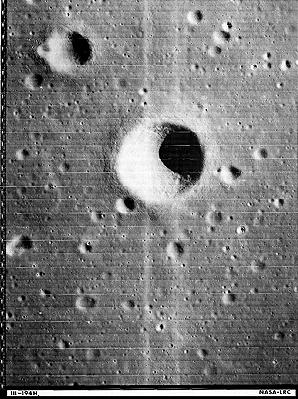Difference between revisions of "February 5, 2004"
| Line 1: | Line 1: | ||
__NOTOC__ | __NOTOC__ | ||
=LO III= | =LO III= | ||
| + | <!-- Start of content --> | ||
<table width="640" border="0" align="center" cellpadding="6" cellspacing="2"> | <table width="640" border="0" align="center" cellpadding="6" cellspacing="2"> | ||
<tr> | <tr> | ||
| Line 54: | Line 55: | ||
</table> | </table> | ||
<p> </p> | <p> </p> | ||
| + | <!-- End of content --> | ||
{{wiki/ArticleFooter}} | {{wiki/ArticleFooter}} | ||
Latest revision as of 18:11, 7 February 2015
LO III
Image Credit: Lunar Orbiter III frame 194 H1 |
|
LO III The trouble with NASA and space exploration is that its lingua franca is jargon and acronyms. "LO III" means nothing to hardly anyone except the spaceniks who remember or read of the remarkable robotic successes that preceded Apollo landings. A series of five Lunar Orbiter spacecraft were designed principally to identify safe landing sites for the first few Apollo landings. Lunar Orbiter III, launched at 0117 GMT 37 years ago today, was a lightweight spacecraft with two cameras - 610-mm focal length for high resolution (1 m) and a 80-mm medium resolution for context. It concluded landing site documentation, freeing up the last two Orbiters for systematic imaging of nearly the entire lunar surface. The image above includes the Surveyor 1 lander but a magnifying glass is required on the full resolution frame. The area is near the crater Flamsteed in Oceanus Procellarum and the largest crater is about 1 km wide. Related Links: Yesterday's LPOD: Copernicus! Tomorrow's LPOD: New and Old All Together |
|
Author & Editor: |
COMMENTS?
Register, Log in, and join in the comments.




